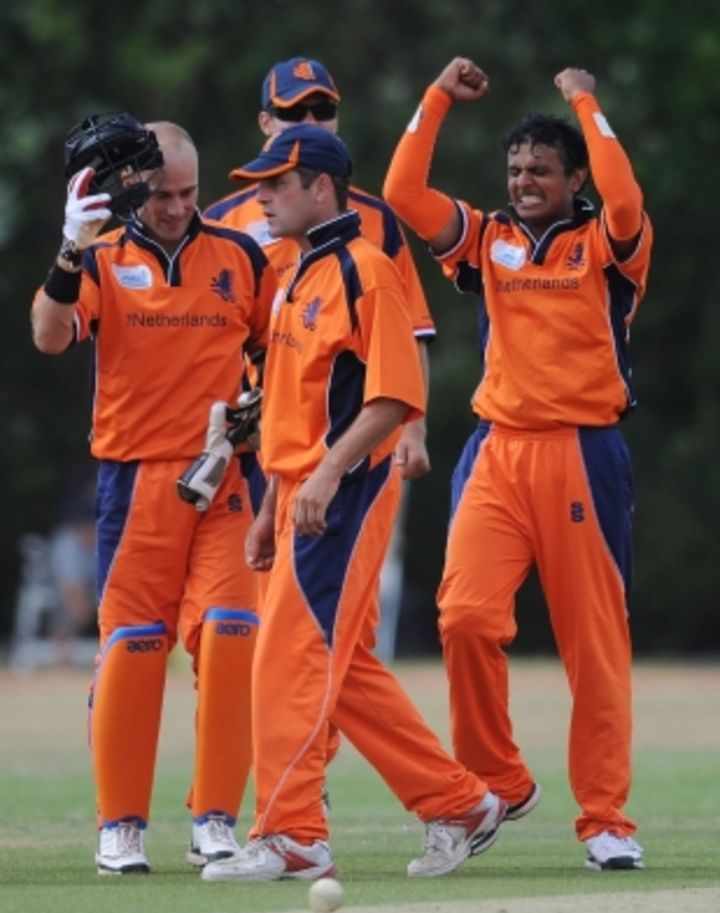Dutch courage
So the Netherlands missed out at the football. Oh well, there's always cricket

I woke up on Monday morning thinking that it was a beautiful day in Johannesburg. Freezing, yes, but sunny and full of birdsong and all those good things. And then I remembered. No more FIFA World Cup. It was all over. I drove to work and saw the same multitude of multicoloured flags, still bravely flapping from car windows and electric-fence posts and even, in a few isolated cases, from flagpoles, and I felt very sad. The players have gone home, the vuvuzelas have been put to better use as funnels through which to siphon petrol, the cup has gone to Spain, and there will be no more mass gatherings in streets and pubs and lounges, no more shouting of "Off side!" and "Get up, you idiot, you're not really hurt!" It's over.
Which means that we can all get back to that other game with 11 players in a team, which is really where we should have been all along. If there was anyone more depressed than I was on Monday morning, it was every player on the Dutch team, and their coach, and their manager, and their families, and all their fans, and all the makers of clogs and orange apparel. No one expects the Spanish opposition, but there they were, brave toreadors charging the orange onslaught and winning.
Let the conquistadors have their day, I say. We're unlikely to see them in a cricket World Cup final anytime soon. Unlike, possibly, the Dutch. I have to clutch at straws here, because I was the one wearing an orange duster on my head on Sunday night (it was the only orange thing I had) and shouting "Go Holland!" - for which I was chastised by another Dutch supporter, who told me that calling the Netherlands Holland is like calling India Bangalore. I wasn't sure what to make of that, so I downed my beer, waved my duster and kept shouting.
I've never been to the Netherlands, but my paternal grandparents came from those parts and one must be loyal. My other side is Irish, and they weren't at the soccer tournament, and everyone knows why, so I didn't shed any tears over the ignominy that called itself a French team.
But back to the Dutch: my uncle Max, now in his eighties and still causing trouble, flew bombers for the Dutch air force during World War II. After the war he was posted to a place they called Dutch East India at the time, and which he doesn't really like to talk about, given that they weren't officially supposed to be there. In between sorties, he and his fellow Dutch pilots would play cricket on the runway, and if any uncontrolled fool hit the ball into the steaming jungle alongside, it was declared an innings.
Now, there are many great works of literature that pretend not to be about cricket and actually are. Marcel Proust's <i>Remembrance of Things Past</i> is clearly a ball-by-ball account of a marathon game. Let anyone who has ever read the whole thing argue with me. Shakespeare's <i>King Lear</i> is about trying to pick a team. <i>Macbeth</i> is about one guy trying to get the other out
It isn't surprising why the Dutch love cricket. There's lots of flat land to play it on and there are lots of wooden clogs that can be beaten flat and refashioned into bats and stumps. Also, if I may stereotype for a second, the Dutch seem mostly to have that calm, phlegmatic disposition so suited to the game.
I've just read Netherland, by Joseph O'Neill, who sounds like an Irishman but isn't. His book is set in New York and on the cover it says it's about cricket. Now, there are many great works of literature that pretend not to be about cricket and actually are. Marcel Proust's Remembrance of Things Past is clearly a ball-by-ball account of a marathon game. Let anyone who has ever read the whole thing argue with me. Shakespeare's King Lear is about trying to pick a team. Macbeth is about one guy trying to get the other out. James Joyce's Ulysses is an epic tale about a lost man's day-long attempt to get to the field.
Netherland, however, says it's about cricket and isn't. It is a rather beautiful book, with some lovely observations about cricket ("There are a few thousand Dutch cricketers and they go about their game with the seriousness and organisation that characterises all of Dutch sport") and the protagonist plays a few scrappy weekend games with a bunch of West Indians, and enjoys himself a bit, but mostly they barbecue and philosophise and try to get their lives to mean something. Cricket, however, even though it isn't played centre stage, is a healing force in this story.
That's my point, really. If I and the Dutch football team and supporters want to feel better about a world in which there will be no football World Cup for four years, let us turn to cricket for succour and nourishment. One of my favourite writers on Page 2 is Rene van Oorschot, who, like many of us in the past two months, forsook his true love for a ball that gets kicked. By now he is probably back at his keyboard, mopping up the last errant tears with an orange duster discarded by some fair-weather fan. But he and all those from the lowlands should lift up their hearts, because you never know, one day the Netherlands might be overlords of cricket. If Spain can win the FIFA World Cup, anything's possible.
Sue de Groot is a Johannesburg-based journalist, columnist and television scriptwriter
Read in App
Elevate your reading experience on ESPNcricinfo App.